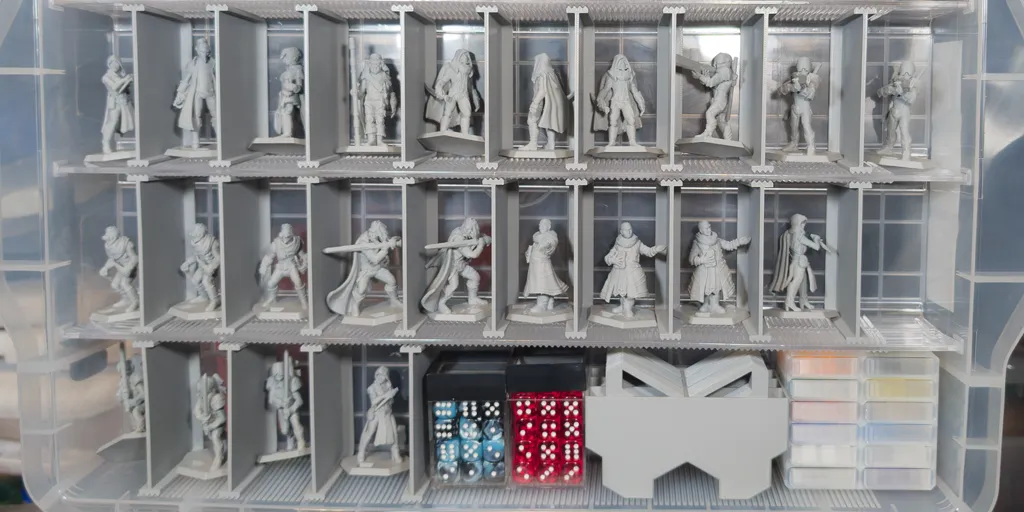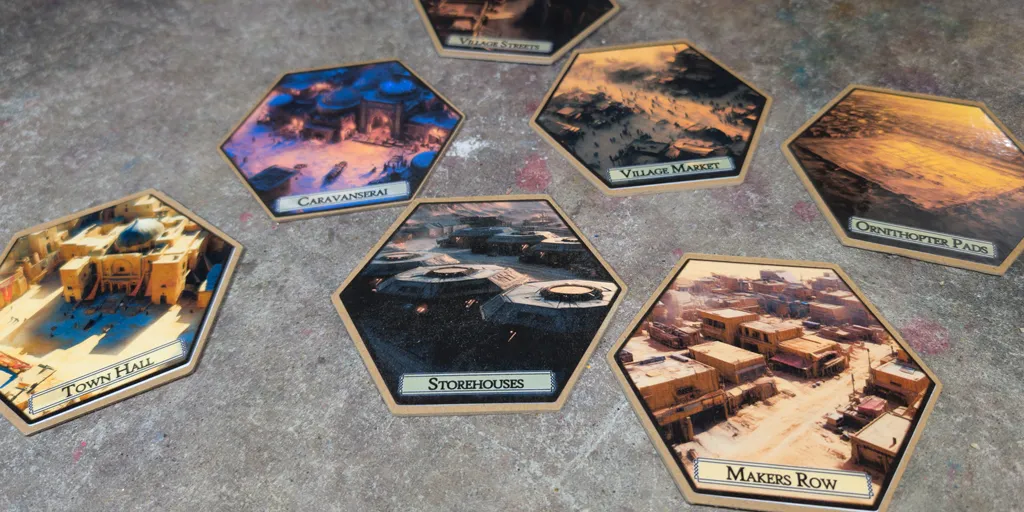
Posted September 22, 2025 by Martin
Roleplay stories in the distant future
I’m a bigger Dune nerd than the average person; I’d even say I’m a bigger Dune nerd than the average Dune nerd.
Frank Herbert’s creation has been a fascination of mine for a long, long time, and I’ve had decades to nurture my obsession. The novels. The board games. The movies. The video games. The TV shows. And, of course, the roleplaying games.
I mean, I even made my own Dune-themed bumper stickers, for Pete’s sake!

If you poke around my website, you’ll find some of my Dune-related creations I’ve shared. Today, I figured it might be nice to share my approach to narrative writing as it relates to Dune, how I conceptualize campaigns set in that universe, and provide pointers on how you can spin a compelling yarn for your table as well.
NOTE: I’ve organized the typical steps I take in a specific order, but I strongly encourage you to experiment and switch things up. Maybe instead of theme and vibe you’ll start with overall campaign goals, figuring out your narrative’s theme later. You could also start with characters you find interesting and then fill in the blanks once you have established your initial cast.
Keep an open mind, use what works for you, discard what doesn’t.
As storytellers, we spend a lot of time thinking about theme. Dune deals with themes such as chance vs. destiny vs. free will, how faith can be both a source of strength and a tool of oppression, the power struggle between money, honor, and influence, and whether leadership should fall to those who are willing to seize it or those who are called to it.
Vibe, on the other hand, gets a lot less play in discussions about writing, and I think that’s a shame. It’s a lot harder to nail down and to articulate precisely, even though you can tell almost immediately what a specific piece’s vibe is. It’s not so much what a story is about, but how it makes you feel.
Dune’s vibe is mysterious, serious, and possessed of a type of violence that’s both brutally visceral but also methodical, almost surgical in its precision. It features elements that are far, far beyond our current understanding, such as spaceships that can travel instantaneously from one part of the galaxy to another, energy shields, laser weapons, body control that’s refined to such a degree that brains can be turned into supercomputers and a human voice into a mind control weapon, and worlds that are profoundly alien. It also includes archaic elements of the distant past: melee warfare, a power structure built on feudalism and a royal court, religious sects intermingling with politics. Dune’s vibe, of course, also has its fair share of modern trappings, like the brutal oppression of indigenous people to exploit their natural resources, ecological transformation, and the use of propaganda to control the population.
Dune is science fiction, but it’s not about spaceships and bug-eyed aliens and exploring the stars. Its themes are about humanity looking inward, struggling to walk a narrow path between sudden and violent self-annihilation and a slow, drawn-out death by stagnation. The setting’s vibe mixes the very ancient and the impossibly advanced with the challenges of today to create a stage where this story can play out.
In coming up with narratives set in the Dune universe, I try to be purposeful about how I leverage theme and vibe. A story about discovering an ancient non-human spaceship and flying it to some unknown part of the galaxy where fantastic adventures await wouldn’t be a good fit for Dune. A “What if…” story where Paul lost his duel with Feyd-Rautha and the Fremen used the Atreides family atomics to destroy Spice production on Arrakis (or the Water of Death, if you go by the books), prompting a House Major desperate for survival to try to locate the original homeworld of the sandworms and harvest Spice once again? That might be a great fit for a Dune TTRPG campaign, promising a story of betrayal, destiny, survival, faith, ultimately asking the question whether the old order should be restored or perhaps a new path forward can be found. A Scattering story millennia before the Scattering in the books.
For your narrative, pick a theme you find compelling, pick a vibe, and see how you can align them with the source material’s vibe and theme.

I’ve gone into roleplay character writing before in the Narrative Writing for Roleplayers series chapter on Allies and Adversaries, and I highly recommend you check out that chapter. When writing a Dune narrative, you can use those techniques to craft believable characters that are in line with the setting’s fiction and help drive your campaign.
Dune includes a number of archetypes, character templates you can leverage to quickly and efficiently come up with people your players will encounter that feel right at home on Arrakis or elsewhere in the Imperium. Archetypes are shortcuts, but they’re useful shortcuts. If you’re playing the TTRPG by Modiphius, the core rulebook includes a number of archetypes and an entire section with other NPCs. They’re great, and you should use them as a resource. That said, I find it’s a useful exercise to go up at least one layer of abstraction, because that allows me to mix and combine different archetypes, and it helps me build characters beyond just Arrakis.
Let’s look at some of these slightly more abstracted character archetypes.
The Survivalist: Survival is a core part of Dune. The Fremen of Arrakis are the most visible example, but the Sardaukar, the Honored Matres, and others are also examples of Dune’s theme that adversity breeds strength. Survivalist characters are extremely self-sufficient, single-minded, and adaptable. They may be individualistic, taking self sufficiency to its logical extreme, or communal, recognizing that working together offers the best chance at survival.
The Survivalist’s theme is “How far will I go to survive?”
The Spy: Intrigue features heavily in Dune, providing fertile ground for spies, scouts, agents, and investigators to thrive. The royal court is lousy with spies, and as anyone who’s played the original Dune board game knows, the Harkonnens are notorious for having a vast network of spies and traitors. Spies deal in secrets and stealth, and they are by nature suspicious, paranoid, deceitful, curious, and intelligent. Some use their gifts to protect their home and their people, while others will look out for their own interests first.
The Spy’s theme is “What is the price of truth?”
The Courtier: How much the royal court and the Landsraad factor into your campaign may vary, but the influence of the Imperium’s feudal system can be felt everywhere. As such, members of the ruling elite can pop up in any situation. Whether they’re a low-ranking officer of a House Minor or a confidant of the Emperor himself, courtiers are marked by ambition, pride, tradition, protocol, and status. They can be dutiful and loyal, or so invested in their own plans that they’ll sacrifice anyone and anything to get ahead.
The Courtier’s theme is “What will I do to leave my mark?”
The Businessperson: Given how intertwined the feudal system and the Imperium’s economy are, the line between businesspeople and courtiers can be blurry. Businesspeople, however, see the line quite clearly: Where the courts revolve around obeying the forms and upholding traditions, businesses concern themselves with practical matters. CHOAM and the Spacing Guild keep the Imperium running, and they need individuals interested in the fine art of commerce. Businesspeople are pragmatic, calculating, cunning, and strategic. It’s not uncommon for them to be transactional and greedy, but they can also be growth-minded and generous.
The Businessperson’s theme is “What’s in it for me?”
The Prophet: One core story driver in Dune is the Bene Gesserit’s attempt to produce a human who can see the future, the Kwisatz Haderach. Along the way, they use and misuse prophecy for their own ends and produce a few failed Kwisatz Haderachs, leaving a trail of prophets strewn across the Imperium. Guild navigators have a form of prescience as well thanks to their excessive Spice consumption, further adding to the setting’s supply of fortune tellers. Prophets tend to be visionary, charismatic, inscrutable, and perceptive; some become delusional and obsessed, others determined and self-assured.
The Prophet’s theme is “What is my destiny?”
The Believer: Faith is the other side of the prophecy coin, and Dune explores themes of faith from many angles. The Fremen’s faith in the Lisan al-Gaib gives them the strength to thrive on one of the Imperium’s most hostile worlds, but this faith was planted by the Bene Gesserit as part of their Missionaria Protectiva designed to oppress people and benefit the sisterhood. In Dune, faith is both empowerment and control. Characters driven by belief are strong-willed, passionate, and idealistic, sometimes turning into zealots blinded by self-righteousness, sometimes leaning on their faith to provide strength and support for others.
The Believer’s theme is “How can I become a more effective instrument of my faith?”
The Warrior: If there’s one constant in the Imperium, it’s war. Houses frequently feud with each other, using commonly established forms of conflict in accordance with the Great Convention. Every House employs Warmasters, Blademasters, and others skilled in the various warfare traditions of the Imperium that come into play when diplomacy, subterfuge, and intrigue fail. The Imperium’s internecine conflicts have forced populations across the galaxy to develop their own warfighting traditions, producing warriors such as the Fremen resistance fighters and later Fedaykin. Warriors are brave, capable, unafraid of violence, and decisive. They may use their skills to protect others, fighting for those who can’t fight for themselves, or they may become conquerors, convinced that might makes right.
The Warrior’s theme is “Which battles are worthy of my blade?”
If you have a theme and vibe for your campaign, think about what kinds of characters would suit that narrative. Do they fit any of these typical archetypes, or do they present mixtures of different characteristics? I enjoy developing personalities that blend different types. A Warrior-Prophet would fit well into many campaigns, as would a Courtier-Spy, or even a Survivalist-Businessperson, for example a smuggler or a local craftsman trying to make ends meet on some hostile world.
Play around with archetypes, and assemble a cast of potential antagonists, allies, and side characters that you and your players find compelling.
I tend to think of writing a campaign like putting together a delicious meal. Theme and vibe give me the general type of food and regional cuisine, characters tell me the flavor profile, and goals are the actual meat and potatoes of narrative writing.
I have a whole blog on Goals, Quests, and Objectives, and if you haven’t already, maybe give that one a read. To summarize, campaign-level goals don’t need to be super specific and can be somewhat broad, but they should have fairly concrete and impactful stakes. They should also be SMART: specific, measurable, achievable, relevant, and time-bound.
When laying out your campaign’s main quests and goals, think about what kind of campaign you’ll be running.
Playing House: Campaigns in Dune often involve the great Houses. Maybe the players are leadership officers of a House, or maybe they are merely its agents. Either way, the goals of House campaigns should leverage the identity of the players’ faction in some way. A technologically advanced House might find itself in conflict with the Ixians, competing to gain a scientific edge over their rivals, with a goal to complete a certain research project by a certain deadline. A House with ambitions to improve its status could get dragged into a deadly game of court intrigue, with an assassin around every corner and a spy in every wall, pursuing a goal of dishonoring or otherwise undermining a rival House. Most Houses have Bene Gesserit sisters among their ranks, and the machinations of that order can lead to all kinds of adventures, perhaps aiding or opposing the sisterhood’s secret breeding program.
The Great Game: Arrakis is the center of the Imperium for a reason, and it’s a great setting for campaigns that deal with the conflict between House Atreides, House Harkonnen, and House Corinno. Depending on what period your campaign is set in, your players could be members of House Atreides right before the fall, Spice smugglers trying not to get caught in the crossfire as the Houses wage war, Spacing Guild agents looking for a way to secure the Guild’s future in the face of a mounting Fremen uprising, or if you’re bold, Harkonnen operatives sent to track down that mysterious deep desert prophet who’s been causing such headaches for the Baron.
Once you have an idea of the type of story and a rough outline of your campaign’s big goal, start thinking about the kinds of conflicts your players will face. Will there be lots of duels, are the players going to fight many skirmishes, are there opportunities for large-scale warfare, how much intrigue and espionage will there be, and so on. This will allow you to sketch out the narrative’s key beats and help dial in your campaign’s pacing.
With all that information in hand, you’ll now be able to start developing more detailed quests and objectives under the main campaign arc.

Not every campaign has to take place on Arrakis, even though it may very much look like all roads lead to Dune. If you do decide that your campaign will be set on Arrakis, though, you’ll have a ton of visual references and other materials to draw on. I find having artwork at hand when writing to be incredibly useful, and trawling the web for environment art is never a waste of time.
As I explained in the chapter about Narrative Locations, it’s important to be conscious of the role each place plays in your story. Don’t include places “just because,” but do find a good storytelling purpose for each: provide context for story characters, create interesting obstacles, and deepen your worldbuilding. If you already know your campaign’s goals and quests, working out which locations your players will visit should be fairly straightforward. Of course, you can also start by compiling a list of locations you’d like to build your story around and work backwards from there.
While the universe of Dune is vast, there are a couple of things to keep in mind.
Many Worlds: Giedi Prime. Caladan. Wallach IX. Salusa Secundus. There are TONS of established worlds across the books and expanded universe material. If your players go planet hopping, consider how much time they’ll spend in each location. If they’re visiting the Harkonnen homeworld for example, what is the one most striking location there that your narrative could be connected to? While I don’t discourage players from ranging far afield, I do like to keep things tight and prefer to focus on a smaller number of well-defined locations rather than a big bunch of “meh” places. Don’t feel like you always have to go for the most high-profile locations, either. Sometimes an obscure place like a fighting pit or an abandoned mine that’s been turned into a smuggler haven can be a more effective narrative location than a throne room or a capital city.
Low-fi Scifi: Dune’s science is both hyper advanced and anachronistic. There’s no rule saying your story can’t take place on a space station, but I personally feel Dune works best planetside. That said, even on the surface of the various worlds of the Imperium, you have plenty of opportunities for classic scifi setpieces. Megafactories, Tleilaxu vats, sprawling metroplexes, secret laboratories, abandoned research stations, they’re all fair game. Spice harvesters are also pretty scifi as far as environments go. Your campaign could even lead your players to a site that’s lain dormant since before the Butlerian Jihad, with machine minds sleeping away the millennia, waiting for the day when they can try to rise again.
Home Base: If your campaign includes a place your players call home (and I believe there are many good reasons why it should), you have some options. Smugglers have their secret bases, Houses have their strongholds, the Fremen have their sietches. If your campaign is more of a galaxy-spanning affair, having a personal spaceship as the party’s home base would also be perfectly in line with the fiction of Dune. They probably won’t have their own private heighliner, but smaller spacecraft exist and are frequently used to travel between stars, either by docking with a Guild heighliner or using non-foldspace drives to travel between worlds. Work with your players to figure out the kind of home base that would make sense for them, but also think of ways how their home can be drawn into conflict. Remember, the universe of Dune is dangerous, and nowhere should ever feel perfectly safe.

So, what does all of this look like in practice? Here’s a very high-level overview of a Dune campaign I wrote and ran a while back.
Session Zero: My players and I spent the first session creating their own House. They were going to play members of the household of a House Minor, specializing in Religion and Warfare. Their House was granted domain over a small, barely terraformed moon, where they train soldiers as part of a war cult that follows the House’s enigmatic leader, the Enlightened One. They offer the service of their warriors to other Houses as soldiers for hire, using deployments on distant worlds as a way to discreetly spread the cult’s belief, known as The Doctrine. The players chose the roles of Blademaster, Marshall, Accountant, and Archivist.
Campaign Premise and Objectives: The campaign takes place shortly after the fall of House Atreides. The player House is contacted in secret by an agent of the Landsraad; rumors abound that the Emperor was involved in the feud between Harkonnens and Atreides, and the Landsraad wants to learn the truth of what happened. At this time, the Harkonnens are suffering significant losses from a Fremen uprising, and Spice production is failing to meet quotas. The Harkonnens are desperate, which the Landsraad perceives as an opening. They know the Harkonnens need to bring more troops to Arrakis to quell the uprising, and the agent has carefully planted the seeds that will make the Harkonnens reach out to the player House in hopes of subcontracting their troops to beef up the military presence on Arrakis. The players are to accompany their House troops to Arrakis and act as a liaison with House Harkonnen, but secretly they are to feed information back to the Landsraad about what they learn on the desert planet. The stakes are high; if the Harkonnens catch on to the deception, it would spell disaster for the player House. But if they obtain evidence implicating the Emperor, they might see their House’s status rise dramatically.
Characters: Based on this premise, I drafted an entire cast of characters for the campaign; you can find that cast here.
Locations: I then went about laying out locations to support the general narrative, including points of interest and associated side characters. This included writeups for a few places on the party’s homeworld, and a lot of locations on Arrakis. There were some duel, skirmish, and warfare scenarios I wanted to weave into the plot, taking place at a fighting pit, a Spice smuggler base, a Fremen village, a cave complex, an abandoned Imperial research station, and at the Imperial flagship’s landing site. In addition to the writeup for each of these, I also designed a map for each location using a modular tile system which I developed for this campaign. Additionally, I wanted the main quest region to be Hagga Basin, so I created a whole map with several villages and other special locations and associated quest chains. That map deserves its own write-up someday.
This ended up being one banger of a campaign. I had a fantastic time running it, and my players were super engaged and eager to continue the story each week. As with all TTRPG campaigns, the story did end up going on some unexpected tangents, but to me that’s some of the best fun you can have in this hobby.
And that about sums up how I approach campaign narrative writing for roleplay in the Dune setting. I hope this gave you at least a few ideas on how you could spice up (I am SO sorry) your own campaigns in the Imperium and beyond.
Thanks for reading!